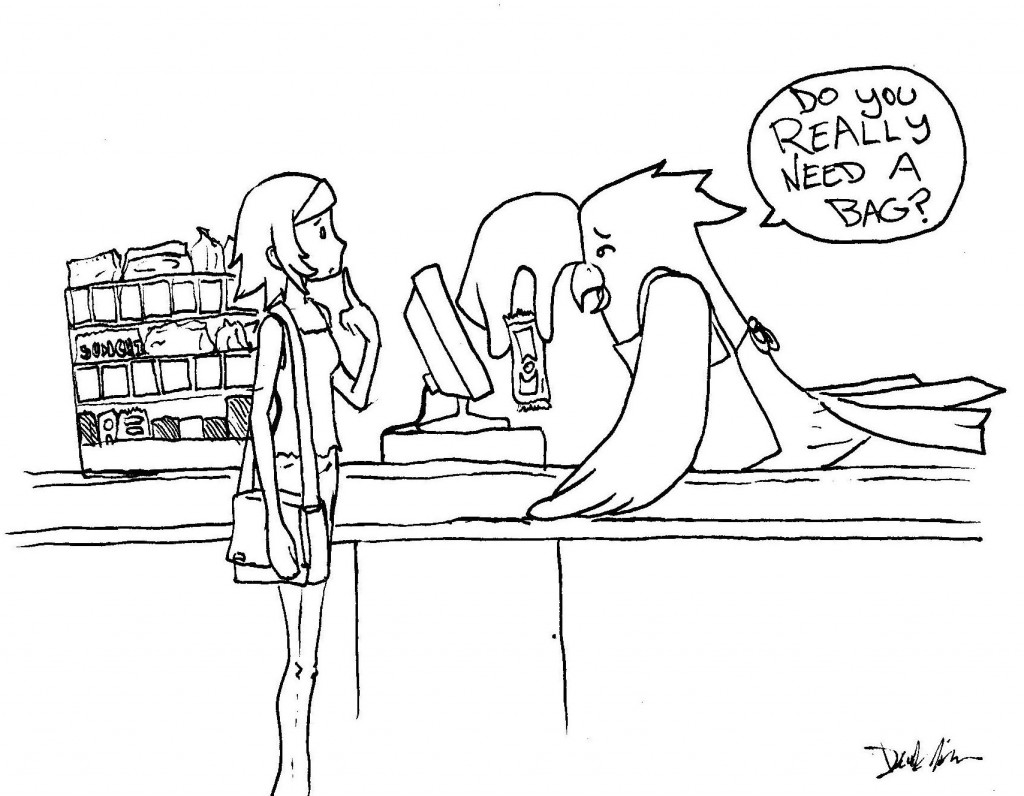

Over the past few years, phrases such as “going green” or “environmentally friendly” have been carelessly thrown around by the government, corporations and individuals. We make promises all the time to help protect the environment, but the majority of the time those promises are hollow and ignored. We believe the time has come for all of us to actually step up and make a difference instead of just lying around complaining about the issue. Let’s start with getting rid of plastic bags.
If you don’t know by now, plastics are extremely slow to decompose and thus cause a great burden not only on the environment, but on waste removal attempts. Plastic bags can be hazardous to various organisms who accidentally consume them or are entangled or smothered by them, ending in a painful death. Due to their light weight and the ease with which they can become airborne, plastic bags are a nightmare for sanitation departments. The bags need to be constantly collected again and again as they fly away from landfills. Due to the extended rate of biodegradation—up to 1,000 years—the bags take up so much space that they cause the landfills to grow larger and larger without end. This, along with fact that rogue bags tend to end up in difficult to reach locations like trees, causes endless amounts of trouble. Most terrifying is that a continent of floating plastic bags is steadily growing within the Pacific Ocean.
Last month, a law banning the use of plastic bags in California was put to vote and was intended to push the state at the vanguard of a global movement to be environmentally conscious. Sadly, the bill was not passed because some believed that during these trying economic times, such bans would hamper any economic growth. This is frustrating news as the damage that plastic bags wreak is ever growing, but luckily supporters of the law have not lost hope, instead such setbacks are being taken in stride and California will most likely have to contemplate the issue again in the near future.
Although the bill failed to pass in California, we believe even in death it should serve as a wakeup call for other states. The best way to see proposed laws like the one in California popping up in our own state is for us to begin taking the issue seriously. First of all, we should stop using plastic bags. How many times have you or anyone you know gotten a soda or mozzarella sticks from the Hawk Street Station and still found the need to put it in a plastic bag? Stop doing this, it’s not only wasteful but just plain lazy. If you plan on getting loads of food, either reuse a bag from a previous purchase, or better yet, purchase one of those inexpensive reusable bags they carry at the majority of large grocery store chains or just use a backpack. Making this small but extremely beneficial change in routine will only serve to help you and the environment.
Some stores even pay you a small amount to use the reusable bags, such as Stop and Shop, which takes five cents off your purchase for every reusable bag you bring. It may not sound like much, but the money adds up over time and the good it allows you to do for the environment is priceless in itself. It’s also much better than the fees some lawmakers have proposed and passed to wean consumers off using plastic bags.
In the end, all that can be said is that plastic bag use needs to stop. Alternatives such as the reusable bags offered in most major grocery stores, not paper or some other ephemeral replacement should be implemented by consumers. We should talk to our representatives about achieving these goals. Tell them you care, especially now during elections when they really want your vote. Also, don’t just stop at plastic bags, there are a million other things that you can do to help the environment. We can start using Nalgene water bottles instead of plastic ones, or ride a bike instead of driving to reduce air pollution. Not using plastic bags should be the first of many steps to help the planet. So go out there and make a difference, because if you try, change might just be in the bag.
Editorials represent the views of the majority of the editorial board. Columns, op-eds and letters, excluding editorials, are solely those of the writers and do not necessarily represent the views of The New Paltz Oracle, its staff members, the campus and university or the Town or Village of New Paltz.
